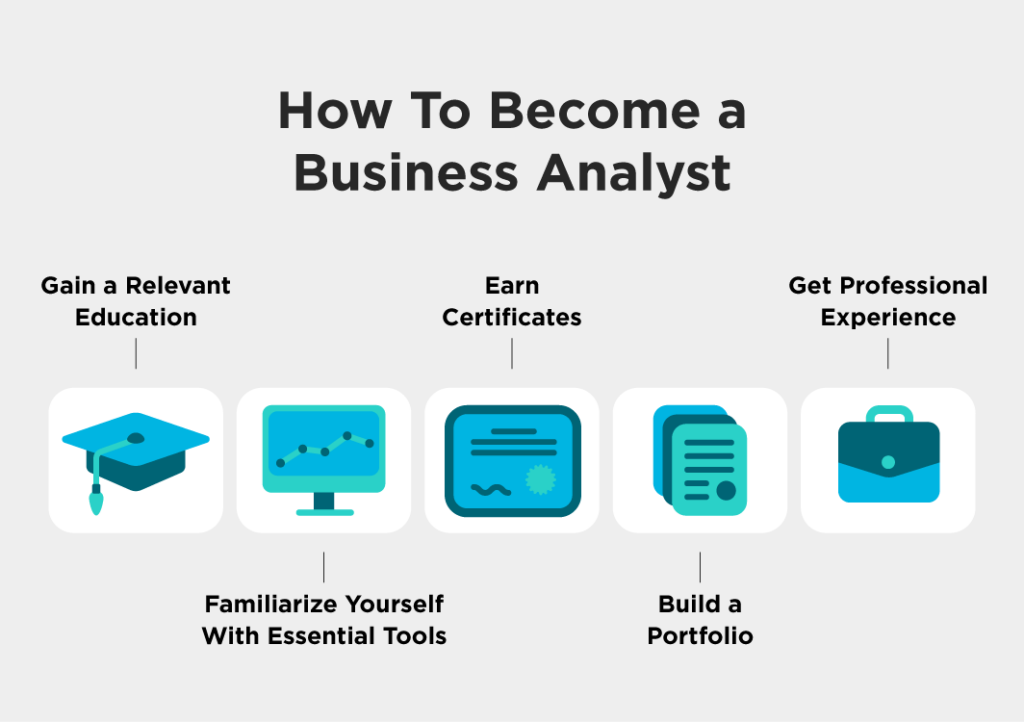How To Become a Business Analyst in 5 Steps [2024 Guide]

quick answer
The five main steps to becoming a Business Analyst are to get an education, learn the necessary tools, earn certificates, build a portfolio, and get experience.
In This Article
Crisp suits, busy days, and boardroom meetings might be the first things that come to mind when you think about the business sector. What most businesses also have in common is the need to analyze data for decision-making purposes. If that interests you, you’re probably wondering how to become a Business Analyst.
Business Analysts, sometimes called Data Analysts, work in various industries and are responsible for many tasks. Regardless of a Business Analyst’s level of seniority or what market they’re in, their main goal is to identify and define solutions that will help a business thrive. Keep reading to learn everything you need to know to make this in-demand career your next move.

Business Analysts (BAs) work behind the scenes to provide management with the information and data they need to make sound decisions. A Business Analyst, sometimes called a Business Intelligence Analyst, uses data to improve business operations and the products and services offered. Business Analysts must conduct extensive research into the company to determine the issues they face and find suitable solutions.
The first step to becoming a Business Analyst is to earn a Bachelor’s Degree. If you’re applying to colleges, consider some of these common majors for Business Analysts:
A business-related education is helpful, but if you already have a Bachelor’s Degree in an unrelated field, you can gain experience in helpful courses by pursuing post-secondary education, practical work experience, or Certificate courses.
Data analytics is a technical and creative career where you’ll need familiarity with various tools to succeed. Whether you teach yourself or take some classes, you should learn how to use these essential programs and coding languages:
This isn’t an exhaustive list of programs, but it’s an excellent place to start if you’re feeling lost. Once you grasp a few of these programs and languages, learning new software will be a bit easier, and you’ll have some practical skills to discuss for job interviews.
Certificates are a great way to demonstrate your mastery of business analytics and your dedication to continued learning. Here are some common Certificates and how you can earn them:
These Certificate programs are for beginners as they don’t require any work experience in business analytics. Each institute also offers more advanced certificates as you progress if you’re looking for career development opportunities.
Regardless of whether you have work experience as a Business Analyst, creating a portfolio you can share with potential employers is essential. If you can’t share real projects from a previous position, you can create a portfolio from publicly available data sets. You can include projects such as exploratory data analysis (EDA), sentiment analysis, and data visualization to flex your skills and share them on your website or in a PDF.
Now that you’ve got the basics down, it’s time to start applying for positions as a Business Analyst. There are many careers under the business analysis umbrella. Some keywords or positions to look out for might be:
Once you have an idea of what type of Analyst positions you’d like to consider, you can reach out to recruiters and start applying to job postings to get your job search started.
Many responsibilities fall under your job description as a Business Analyst. Below are some examples:

How can you know if business analytics is for you? Here are some qualities that might draw you to this career:
If these qualities sound like you, you might want to consider a career in data analytics, where these qualities will be rewarded.

According to the Government of Canada, the hourly wage for a Business Analyst ranges from $33.04 to $53.38. This translates to roughly $69,000 to $111,000 per year, though the average annual salary for a Business Analyst is just under $75,000 in Canada. Here’s the median hourly rate per province and territory:
|
Business Analyst Wages by Province |
|
|
Province |
Median Hourly Rate |
|
Nunavut |
$53.38 |
|
Northwest Territories |
$50.43 |
|
Yukon |
$48.06 |
|
Alberta |
$47.96 |
|
Quebec |
$43.96 |
|
Newfoundland and Labrador |
$42.16 |
|
Saskatchewan |
$41.21 |
|
Ontario |
$41.03 |
|
Manitoba |
$41.03 |
|
British Columbia |
$40.87 |
|
Nova Scotia |
$38.46 |
|
New Brunswick |
$36.06 |
|
Prince Edward Island |
$33.04 |
|
Source: Government of Canada Job Bank |
|
Though there are many different aspects to the role, Business Analysts are generally responsible for gathering research, presenting solutions, and then implementing these solutions in the form of new or adapted technology. In the process, a Business Analyst might need to do the following:
Reading through Business Analyst job postings is helpful because it helps you identify common themes so you can optimize your resume to book more interviews.
If learning about business processes, understanding and deciphering data, and solving complex problems seem up your alley, then becoming a Business Analyst may be the career for you. At Robertson, we offer Introduction to Data Analysis, a micro-course that will be very helpful in getting you started down this career path.
If you’re ready to take a deep dive into data analytics education, our partnership with Assiniboine Community College offers a Data Analyst Advance Diploma prepare you to enter the workforce as a Business Analyst.
In This Article
Once you take the first step, one of our Student Admissions Advisors will get in touch to better understand your goals for the future.
Apply Now